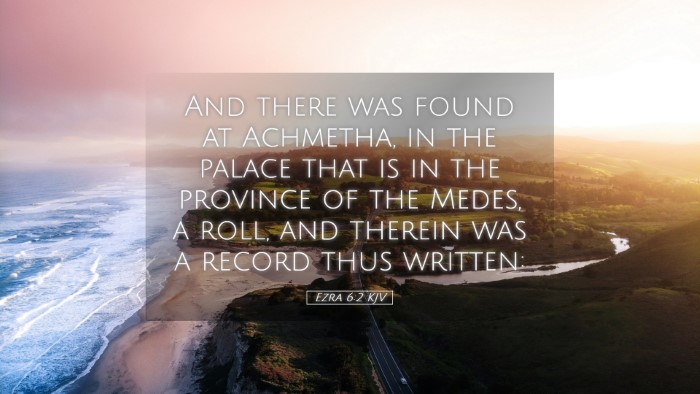Old Testament
Genesis Exodus Leviticus Numbers Deuteronomy Joshua Judges Ruth 1 Samuel 2 Samuel 1 Kings 2 Kings 1 Chronicles 2 Chronicles Ezra Nehemiah Esther Job Psalms Proverbs Ecclesiastes Song of Solomon Isaiah Jeremiah Lamentations Ezekiel Daniel Hosea Joel Amos Obadiah Jonah Micah Nahum Habakkuk Zephaniah Haggai Zechariah MalachiEzra 6:2
Ezra 6:2 KJV
And there was found at Achmetha, in the palace that is in the province of the Medes, a roll, and therein was a record thus written:
Ezra 6:2 Bible Commentary
Commentary on Ezra 6:2
Ezra 6:2 states:
“And there was found at Achmetha, in the palace that is in the province of the Medes, a roll, and therein was a record thus written.”
Introduction
This verse marks a significant moment in the historical narrative of the Jewish return from exile and the rebuilding of the Temple. It highlights the providential workings of God in bringing forth the necessary documentation that would lead to the completion of this sacred project. Understanding this verse requires careful reflection on the broader context, including the challenges faced by the Israelites, the role of Persian authorities, and the implications of found records.
Historical Context
The return from Babylonian exile was marked by various obstacles, including opposition from neighboring peoples and bureaucratic delays. Ezra 6:2 shows a pivotal turning point when King Darius I of Persia ordered a search for documents related to the decree made by Cyrus, the previous king, allowing the Jews to rebuild their temple.
Insights from Commentators
- Matthew Henry:
Henry points out the significance of the roll found in Achmetha. He emphasizes that the discovery was not merely a historical event, but an act of divine providence. It underscores God’s sovereignty in ensuring that His promises are fulfilled amid human opposition and forgetfulness.
- Albert Barnes:
Barnes elaborates on the location, Achmetha, as a signifier of Persian influence. He suggests that the document’s discovery reflects the power of history and records in legitimizing actions taken by rulers. This illustrates the broader theme of God's hand in seemingly mundane affairs, which ultimately serve His divine purposes.
- Adam Clarke:
Clarke provides a deeper examination of the text's Hebrew origins and the implications of the word "roll." He indicates that the term suggests a formal record, emphasizing the importance of legal documentation in the governance of the Persian Empire. Clarke also remarks on the nature of records as being tools of both memory and authority.
Theological Implications
This verse invites theological reflection on several important themes:
- Divine Providence:
The finding of the scroll represents God’s guidance over the affairs of men. It serves as a reminder that God works through history and human institutions to fulfill His promises.
- The Importance of Documentation:
Documentation plays a crucial role in governance and accountability. It indicates a systematic approach to leadership and reflects a respect for the rule of law.
- God’s Faithfulness:
In the broader narrative, this event reinforces the idea that God remains faithful to His covenant with His people, ensuring their restoration and facilitating the re-establishment of worship in Jerusalem.
Application for Contemporary Believers
For pastors, students, theologians, and Bible scholars, several applications can be drawn from Ezra 6:2:
-
Trust in God's Plan:
Just as the Israelites faced uncertainty, believers today can find comfort in the knowledge that God is orchestrating events in their lives, leading to fulfillment of His purpose.
-
The Role of History:
Scholars are encouraged to appreciate the significance of historical documents in understanding biblical texts. This enhances the study of Scripture as a living document that interacts with human history.
-
Encouragement for Leadership:
Church leaders can glean insights on the importance of accountability and transparent governance within their institutions, reflecting the principles observed in the Persian model.
Conclusion
Ezra 6:2 serves not only as a historical marker but as a theological affirmation of God's faithfulness, providential care, and the significance of authority and accountability in leadership. Understanding this verse in its context enriches the biblical narrative and provides timeless truths for the contemporary church.


